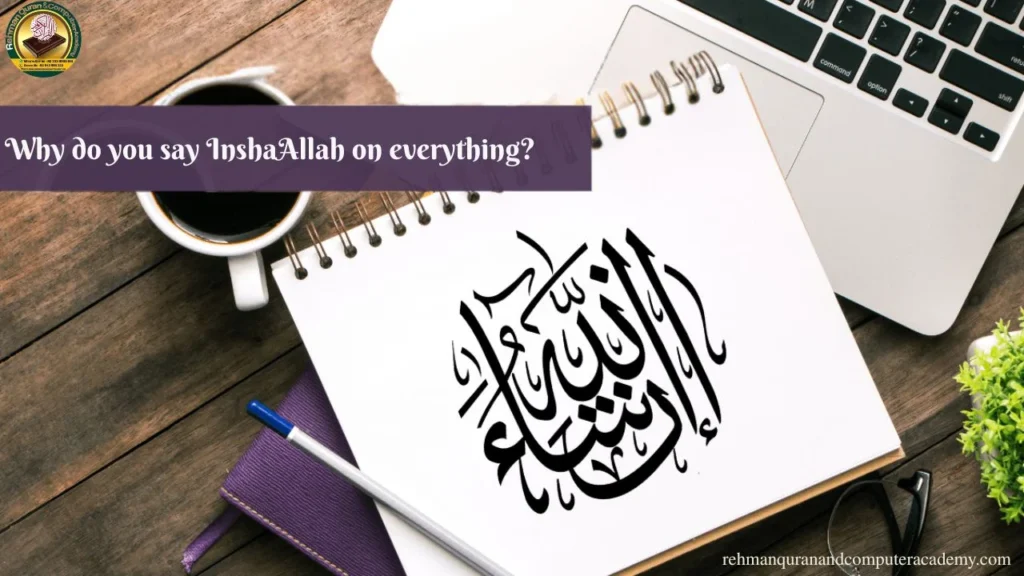Have you heard someone say “InshaAllah” and wondered why? “Inshallah is an Arabic word that means ” if Allah wills” or “God willing,” Muslims say it often to show hope or a wish and to show that only Allah knows the future. In this article, we will learn why people say “InshaAllah” so much and what it means to Muslims.

The Roots of “Inshallah” in Islamic Faith
“Inshallah” has its roots in the Quran, the holy book of Islam. In Surah Al-Kahf (18:23-24), Muslims are reminded not to make promises without saying, “Inshallah.” It is a reminder of the inherent uncertainty of life and that everything happens by the will of Allah. It instills a sense of humility, showing that humans are not in complete control of their plans or destiny.
Why Do Muslims Say “Inshallah” So Often?
Muslims say Inshallah” a lot because it shows that God controls everything, big or small. Whether you plan to meet a friend, travel, or finish a job, say Inshallah” means you trust Allah’s power. It also reminds you that life can change, and you need to trust God’s plan.
The Use of “Inshallah” in Daily Life
People say “Inshallah” in many situations. They might say, “I’ll see you tomorrow, Inshallah,” in a casual talk. Or they may say, “I’ll pay the debt, Inshallah,” for a serious promise. The word means things depend on Allah’s will. It is used in both religion and daily life in Muslim communities.
Cultural Significance of “Inshallah”
Besides its religious meaning, “Inshallah” is important in culture too. In some places, people say Inshallah” to show hope when they make plans or promises. It helps people feel connected and understand that life can change. Sometimes, people say Inshallah as habit, without thinking much about it.
Spiritual Humility and Trust in Allah
One of the primary reasons “InshaAllah” is so important is the spiritual humility it conveys. By saying “InshaAllah,” Muslims express their trust in Allah’s plan and admit that they cannot guarantee the future. This fosters a sense of peace and patience, knowing that whatever happens, it is Allah’s will. It also encourages people to be sincere in their efforts while leaving the outcome in God’s hands.
How Muslims Use the Phrase “InshaAllah”
InshaAllah for Future Events
In Islamic tradition, it’s essential to say InshaAllah” when talking about future events. This could be something simple like planning to go to work the next day or a larger event like getting married. By adding “Inshallah,” a Muslim shows that they are aware that only Allah controls whether those events will take place.
Inshallah, in Everyday Conversations
You often hear “Inshallah” when friends, family, or coworkers talk. People say it when they plan to meet or hope for something to happen. Say Inshallah” reminds them that Allah is part of their lives.
Common Misunderstandings About “Inshallah”
A common misconception is that say Inshallah” is a way to avoid commitment. Some people might use the phrase half-heartedly, knowing they might not follow through with their promise. However, in Islamic teaching, “Inshallah” is meant to be sincere. It should not be used as a way to dodge responsibility but rather to acknowledge Allah’s will over the outcome.
Should Someone Say Inshallah for Deeds They Mean to Do But Intentionally Not?
Sincerity in Intention
It is highly discouraged to say Inshallah” if you have no intention of performing the act. If someone say Inshallah” but knows they won’t do what they’re promising, they are being dishonest. The phrase is meant to reflect genuine intentions, coupled with a recognition that Allah has the final say.
When “Inshallah” Becomes Misused
Sadly, there are instances where “Inshallah” has become a way to politely decline without directly saying no. This is a misuse of the phrase. The integrity behind “Inshallah” should always be maintained, and Muslims are encouraged to only use it when they genuinely hope and intend to fulfill the promise.
When to Say “Inshallah” and When Not to
In the Islamic faith, the phrase “Inshallah” holds profound significance as a reminder of divine will. Derived from Arabic, it translates to “if God wills” or “God willing.” Muslims incorporate it into daily conversations to express humility and acknowledgment that ultimate control over events lies with Allah. Understanding when to use “Inshallah” and when it might not be necessary helps in practicing the faith authentically while avoiding misuse that could dilute its spiritual essence. This balance fosters a mindful approach to language, aligning words with Islamic principles of tawhid (the oneness of God) and submission to His decree.
Appropriate Situations for “InshaAllah”
The phrase “Inshallah” is most fitting when discussing future events, plans, or aspirations, as it underscores the uncertainty of life and the supremacy of Allah’s will. For instance, when making commitments like “I will meet you tomorrow, Inshallah,” it conveys intention while recognizing that unforeseen circumstances—guided by divine wisdom—might alter outcomes. This usage is rooted in the Quran, particularly in Surah Al-Kahf (18:23-24), where Allah instructs the Prophet Muhammad (peace be upon him) not to speak of future matters without adding “Inshallah.” It serves as a safeguard against arrogance, reminding believers that human efforts are secondary to God’s plan.
In everyday scenarios, “Inshallah” applies to a wide array of situations. Planning a family gathering? Say, “We’ll have dinner together next week, Inshallah.” Expressing hopes for health or success? “I hope to recover soon, Inshallah.” Even in professional contexts, such as business meetings or travel arrangements, appending “Inshallah” promotes ethical communication by tempering certainty. It’s not just verbal etiquette; it’s a spiritual practice that cultivates reliance on Allah (tawakkul). During prayers or supplications (du’a), it’s common to end with “Inshallah” to align personal desires with divine approval.
Moreover, “Inshallah” extends to broader life goals, like career ambitions or marriage prospects. By saying it, Muslims invite blessings and protection from overconfidence, which could lead to disappointment if plans falter. In cultural contexts across Muslim-majority countries, from the Middle East to South Asia, it’s a staple in polite discourse, softening promises and fostering mutual understanding. However, overuse without sincerity can render it mechanical, so intention (niyyah) is key—utter it with genuine faith to reap its spiritual benefits, such as inner peace and resilience against life’s unpredictability.
Times When “InshaAllah” Isn’t Necessary
While “Inshallah” is a beautiful expression of faith, it’s not required in every context, particularly when referring to the past or completed actions. For events that have already occurred, such as “I visited the mosque yesterday,” adding “Inshallah” would be illogical because the outcome is no longer pending on divine will—it’s already manifested. The phrase is forward-looking, tied to the unknown, so retroactively applying it doesn’t align with its purpose.
In discussions of historical facts or established knowledge, “Inshallah” is superfluous. For example, stating “The Prophet Muhammad (PBUH) was born in Mecca” needs no qualifier, as it’s a settled matter. Similarly, in immediate or certain actions under human control, like “I am eating now,” it’s unnecessary. Islamic scholars emphasize moderation; Imam Al-Ghazali in his works on ethics warns against habitual phrases without meaning, which could border on insincerity.
There are also sensitive situations where “Inshallah” might imply doubt inappropriately. In affirming core beliefs, such as “Allah is One,” it’s not added, as it could suggest conditionality on unquestionable truths. During acts of worship already in progress, like performing salah, one doesn’t interject “Inshallah” mid-ritual. Recognizing these boundaries prevents the phrase from becoming a crutch and preserves its sanctity for truly uncertain futures.
What Happens When You Say “Wallahi InshaAllah”?
Combining oaths with expressions of divine will adds layers of solemnity and humility to speech. “Wallahi InshaAllah” merges a swear with a conditional acknowledgment, often used in promises that carry weight but remain subject to God’s decree. This phrase reflects the intricate balance in Islamic etiquette between assertiveness and submission.
Understanding the Phrase “Wallahi”
“Wallahi,” meaning “by Allah” or “I swear by Allah,” is an oath that invokes God’s name to affirm truthfulness or commitment. It’s derived from the root word for oath (walah) and is used sparingly due to its gravity. The Prophet Muhammad (PBUH) advised against frequent swearing, as noted in hadiths from Sahih Bukhari, to avoid diminishing its impact or risking falsehood, which is a major sin.
In practice, “Wallahi” emphasizes sincerity in disputes, agreements, or testimonies. For example, “Wallahi, I didn’t take it” underscores honesty. However, Islamic teachings stress fulfilling oaths; breaking one requires atonement (kaffarah), like feeding the poor or fasting. Thus, it’s a tool for building trust but demands accountability.
Combining “Wallahi” with “InshaAllah”
When paired as “Wallahi InshaAllah,” it creates a nuanced promise: swearing to an intention while deferring to Allah’s will. This is common in strong assurances, like “Wallahi, I’ll help you tomorrow, InshaAllah,” blending firm resolve with humility. It mitigates the absoluteness of the oath, acknowledging that despite best efforts, divine intervention prevails.
This combination prevents overpromising, aligning with Quranic guidance in Surah Al-Ma’idah (5:89) on oaths. It’s particularly useful in cultures where direct refusals are impolite; it softens commitments without deceit. However, scholars like Ibn Taymiyyah caution against casual use, as it could confuse intent. Properly employed, it fosters ethical communication, reinforcing faith while honoring promises.
“InshaAllah”: What Does It Mean?
At its core, “Inshallah” is an embodiment of Islamic theology, expressing submission to Allah’s omnipotence. It’s not mere optimism but a declaration of faith in qadar (divine predestination), reminding believers that human agency is limited.
What “InshaAllah” Means to Muslims
To Muslims, “Inshallah” evokes tranquility amid chaos. It shifts focus from self-reliance to divine trust, as in the hadith where the Prophet (PBUH) said, “Tie your camel and trust in Allah.” In daily life, it alleviates anxiety over outcomes, promoting gratitude (shukr) whether plans succeed or not. Globally, from Indonesian markets to Moroccan homes, it’s a cultural unifier, symbolizing shared belief.
The Connection Between “Inshallah” and Patience
“Inshallah” deeply intertwines with sabr (patience), teaching acceptance of Allah’s timing. In a fast-paced world, it counters impatience, as seen in stories of prophets enduring trials. Saying it builds resilience, turning delays into opportunities for reflection and growth, ultimately leading to spiritual maturity.
FAQs: Why do you say InshAllah on everything?
What does InshaAllah mean in Islam?
InshaAllah means “If Allah wills.” It reflects a Muslim’s belief that everything happens only by Allah’s will and permission.
Why do Muslims say InshaAllah in everyday conversations?
Muslims say InshaAllah to express hope for the future while acknowledging that only Allah controls what will happen.
Is saying InshaAllah mandatory for Muslims?
It’s not obligatory, but highly recommended as a sign of faith and humility when talking about future actions.
What’s the difference between InshaAllah and MashAllah?
InshaAllah means “if Allah wills” for future events, while MashAllah means “what Allah has willed” to show appreciation for something good.
When should you say InshaAllah correctly?
Say InshaAllah whenever you make a promise, plan, or talk about something you intend to do in the future.
What happens if someone forgets to say InshaAllah?
Nothing sinful happens, but saying InshaAllah reminds you to rely on Allah’s will for your plans to succeed.
Why do Arabs and Muslims always say InshaAllah for future events?
It’s a cultural and religious habit rooted in the Quran, emphasizing trust in Allah’s plan for all outcomes.
Can non-Muslims say InshaAllah too?
Yes, anyone can say InshaAllah to mean “hopefully” or “God willing,” showing respect for its meaning.
Is it wrong to use InshaAllah sarcastically or casually?
Using InshaAllah sarcastically weakens its spiritual meaning. It’s best used sincerely when you truly intend something.
What does the Quran say about saying InshaAllah?
The Quran (Surah Al-Kahf 18:23–24) teaches believers to say InshaAllah when speaking about future intentions.
Allah says in the Quran, “Will they not, then, ponder over this Qur’an?
Remember, the goal is to read with understanding and devotion, not just speed. Encourage children to enjoy the process and develop a lifelong connection with the Quran. We have been teaching the Quran online with Tajweed all over the world since 2011. We provide online Quran and Islamic classes for kids at flexible times and sitting at home—3-day free trial classes for your satisfaction. Male and Female Tutors are available. Please take demo classes to see our service In sha Allah, you will never regret it.
Conclusion: Why do you say InshAllah on everything?
In conclusion, “InshaAllah” is more than just a phrase; it reflects faith, humility, and trust in Allah. It’s a reminder that the outcome is in God’s hands, no matter how much we plan or wish. This deep-rooted expression in Islamic culture encourages patience, sincerity, and submission to divine will.

